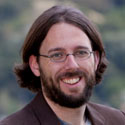Academic Editors
The following people constitute the Editorial Board of Academic Editors for PeerJ. These active academics are the Editors who seek peer reviewers, evaluate their responses, and make editorial decisions on each submission to the journal. Learn more about becoming an Editor.

Benjamin J. Whalley
Senior Lecturer in Pharmacology, University of Reading. British Neuroscience Association Local Group Representative. British Pharmacological Society (Member). UK Epilepsy Research Network (Interventions & Therapies CWG). Pharmacist (GPhC registered).
Investigating unmet clinical need in epilepsy with a specific focus on cannabinoid pharmacology using preclinical animal models and electrophysiological techniques supported by convention molecular and biochemical approaches.

Easton R White
I am a quantitative marine ecologist who uses mathematical and statistical tools, coupled with experiments and field observations, to answer questions in ecology, conservation science, sustainability, and ecosystem management. Most of my work is focused on marine systems, especially fisheries and spatial planning. I am a new Assistant Professor in the Department of Biological Sciences at the University of New Hampshire. Prior to joining UNH, I was a research associate at the University of Vermont with the QuEST program, a NSF-funded PhD traineeship focused on quantitative skills, interdisciplinary work, as well as diversity and inclusion.
I currently conduct research on assessing the effectiveness of protected area networks, improving species monitoring programs, and modeling socio-ecological systems in the context of fisheries. My work centers on how environmental variability, in particular rare events (e.g., hurricanes, COVID-19 pandemic), affects ecosystems and those that depend on them. My current work is funded through a NSF grant focused on interdisciplinary approaches to study coupled natural-human systems with Madagascar fisheries as a case study.

Ethan P White
Associate Professor in the Department of Wildlife Ecology and Conservation at the University of Florida. Moore Foundation Investigator in Data-Driven Discovery. National Science Foundation CAREER 'Young Investigators' Award recipient. Member of the Data Carpentry and Impactstory boards of directors.
My research focuses on data-intensive questions in ecology, using large ecological datasets, advanced statistical/machine learning methods, and theoretical modeling to understand ecological patterns.

Andrew Whitehead
Associate Professor in the Department of Environmental Toxicology, and Center for Population Biology, University of California at Davis. Research in Environmental, Ecological, and Evolutionary Genomics.

Katrine L Whiteson
Katrine Whiteson uses metagenomics, metabolomics, microbiology and ecological statistics to answer questions about how microbes and viruses affect human health. She studied Biochemistry at UC Berkeley (BA, 2000) and University of Chicago (PhD, 2007). During her PhD, Dr. Whiteson focused on the active site chemistry and DNA binding specificity of a site-specific recombinase from the class of proteins that enable the spread of antibiotic resistance genes. In 2008, she began a new job at the University of Geneva Hospitals with Dr. Jacques Schrenzel and Dr. Patrice Francois. This was an exciting era, just at the start of the Human Microbiome Project, for asking basic unanswered questions about the microbes and viruses inhabiting various niches of the human body. Dr. Whiteson focused on the oral microbial communities of healthy Europeans, and malnourished kids in Niger who develop a devastating facial gangrene known as noma. In 2011 she moved to Forest Rohwer’s lab at San Diego State, where she undertook breath and sputum metabolite analysis to better understand the activity of CF patient microbial communities from Dr. Doug Conrad’s Adult CF clinic at UCSD. Combining information about the genetic potential of a microbial community through DNA sequencing with the activity of the community by metabolite profiling is a powerful approach that Dr. Whiteson hopes to employ in future projects as she begins her own lab at University of California Irvine in Fall 2014.

Jennifer L Whitwell
Associate Consultant and Associate Professor of Radiology, Mayo Clinic.
Research focuses on the investigation of neuroimaging biomarkers in different neurodegenerative disorders, particularly frontotemporal dementia, primary progressive aphasia, atypical Alzheimer's disease and progressive supranuclear palsy.
Editorial board member, Scientific Reports journal, Nature Publishing Group, 2014-present
Academic Editor, PeerJ journal, 2012-present
Junior Investigator Award for Excellence in Imaging and Aging Research, American Federation for Aging Research-GE Healthcare, 2010
Best Paper in Alzheimer's Disease Neuroimaging: New Investigator Award, Alzheimer's Association, 2009

Joëlle Wiels
Joëlle Wiels received her PhD in Genetics from Université Paris 6-Denis Diderot and then spent two years as a Post-doctoral fellow in the Division of Biochemical Oncology (Fred Hutchinson Cancer Research Center) headed by Professor Hakomori. She then moved back to France where she studied the role of glycosphingolipids in both normal and tumoral B lymphocytes. Since 1991, her main research interests include analysis of apoptotic signaling pathways and of resistance to cell death developped by B cell lymphomas. She is currently affiliated at the METSY CNRS Unit located at the Gustave Roussy Institut in Villejuif (France)

Janet Wiles
Professor of Complex and Intelligent Systems at the University of Queensland.

Siouxsie Wiles
Dr Siouxsie Wiles MNZM studied medical microbiology at the University of Edinburgh, followed by a PhD in microbiology at the Centre for Ecology and Hydrology in Oxford and Edinburgh Napier University. She is currently an associate professor at the University of Auckland. There she heads up the Bioluminescent Superbugs Lab where she and her team make nasty bacteria glow in the dark to find new antibiotics and to better understand how bacteria become more infectious. Siouxsie has won numerous awards for both her science and her science communication. In 2017 she published her first book, ‘Antibiotic resistance: the end of modern medicine?’ and in 2019 was appointed a member of the New Zealand Order of Merit for services to microbiology and science communication. When the pandemic arrived, Siouxsie joined forces with Spinoff cartoonist Toby Morris to make the science of COVID-19 clear and understandable. Their award-winning graphics have been translated into multiple languages and adapted by various governments and organisations around the world. Siouxsie was the Supreme Winner of the Stuff Westpac 2020 Women of Influence Award, named by the BBC as one of their 100 influential women of 2020, and in 2021 was named Kiwibank New Zealander of the Year.

Peter Wilf
After my eclectic and non-geological 20s, I discovered geology and then paleobotany and have never looked back. Most of my thesis research (Penn Geology) was done in residence at the Smithsonian, on megafloral and paleoclimatic change across the Paleocene-Eocene boundary in southern Wyoming. During this time and in an ensuing Smithsonian postdoc, I began developing two major subsequent themes of my research: the fossil history of plant-insect associations and the remarkable riches of Patagonian fossil floras. I spent three years at Michigan, 1999-2002, as a Michigan Fellow and happily joined the Penn State Geosciences faculty in 2002, where I have been developing these and several other wonderful research projects with my students and colleagues all over the world.

Claus O Wilke
Professor and Department Chair, Department of Integrative Biology, The University of Texas at Austin. Received his PhD in Theoretical Physics from the University of Bochum, Germany, in 1999. Postdoc at Caltech, 2000-2005.

Diego Veras Wilke
Professor of physiology and pharmacology at Federal University of Ceara. Research focuses on a combination of marine natural product discovery with molecular and cellular biology to identify new anticancer leads.

